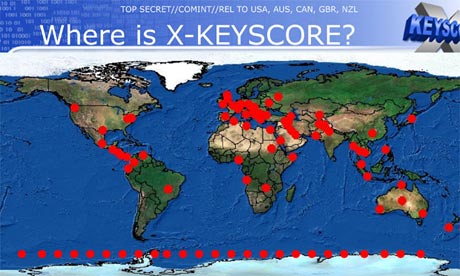 Low-skilled Mexican-born U.S. workers shielded low-skilled U.S.-born workers from job losses during the Great Recession by returning to Mexico, a study found.
Low-skilled Mexican-born U.S. workers shielded low-skilled U.S.-born workers from job losses during the Great Recession by returning to Mexico, a study found.
The lesser-skilled immigrant workers were much more ready to move for jobs elsewhere when the economy soured than comparably skilled U.S.-born workers, the study by the non-profit National Bureau of Economic Research indicated.
Study: Latino immigrants shielded U.S. workers from job cuts
U.S. directs agents to cover up program used to investigate Americans
 A secretive U.S. Drug Enforcement Administration unit is funneling information from intelligence intercepts, wiretaps, informants and a massive database of telephone records to authorities across the nation to help them launch criminal investigations of Americans.
A secretive U.S. Drug Enforcement Administration unit is funneling information from intelligence intercepts, wiretaps, informants and a massive database of telephone records to authorities across the nation to help them launch criminal investigations of Americans.
Although these cases rarely involve national security issues, documents reviewed by Reuters show that law enforcement agents have been directed to conceal how such investigations truly begin - not only from defense lawyers but also sometimes from prosecutors and judges.
Florida's Education Chief Resigns Over Grading Scandal
In education circles, Tony Bennett is widely known as a hard-charging Republican reformer associated with Jeb Bush's prescriptions for fixing public schools: charter schools, private school vouchers, tying teacher pay to student test scores and grading schools on a A through F scale.
Bennett resigned from his post as Florida's education chief this morning when a controversy over the last of those things — the school grades — caught up with him.
XKeyscore: NSA tool collects 'nearly everything a user does on the internet'
 A top secret National Security Agency program allows analysts to search with no prior authorization through vast databases containing emails, online chats and the browsing histories of millions of individuals, according to documents provided by whistleblower Edward Snowden.
A top secret National Security Agency program allows analysts to search with no prior authorization through vast databases containing emails, online chats and the browsing histories of millions of individuals, according to documents provided by whistleblower Edward Snowden.
The NSA boasts in training materials that the program, called XKeyscore, is its "widest-reaching" system for developing intelligence from the internet.
Court says no warrant needed for cellphone tracking
Authorities only need a court order and not a more stringent search warrant to obtain cellphone records that can be used to track a person’s movements, a federal appeals court ruled on Tuesday.
The 5th U.S. Circuit Court of Appeals overturned an order by a Houston federal judge who had said cellphone data is constitutionally protected from intrusion and can only be acquired with a search warrant.
Gunman among 7 dead after Fla. hostage standoff
 A hostage situation and mass shooting that ended this morning with seven people dead in the South Florida town of Hialeah began when an elderly couple who managed the apartment complex left the granddaughter they were watching and went to talk to a tenant living with his mother, according to reports.
A hostage situation and mass shooting that ended this morning with seven people dead in the South Florida town of Hialeah began when an elderly couple who managed the apartment complex left the granddaughter they were watching and went to talk to a tenant living with his mother, according to reports.
That commonplace act led to a barrage of gunfire that killed the couple, a man walking his children home and three other people apparently going about their business Friday night, according to police. The incident ended when a SWAT team stormed the apartment early Saturday where two hostages were being held by a man suspected of shooting six people.
Former UBS bankers get prison terms for muni bid-rigging
Three former UBS AG (UBSN.VX) bankers were sentenced to prison on Wednesday for deceiving U.S. municipalities by rigging bids to invest municipal bond proceeds, with the longest sentence at 27 months, a fraction of what prosecutors had sought.
Gary Heinz, 40, a former bank vice president who was caught on recordings discussing the scheme, received the prison sentence of 27 months. U.S. District Judge Kimba Wood also ordered Heinz to pay a $400,000 fine.
More Articles...
Page 96 of 221

 Domestic Glance
Domestic Glance






























